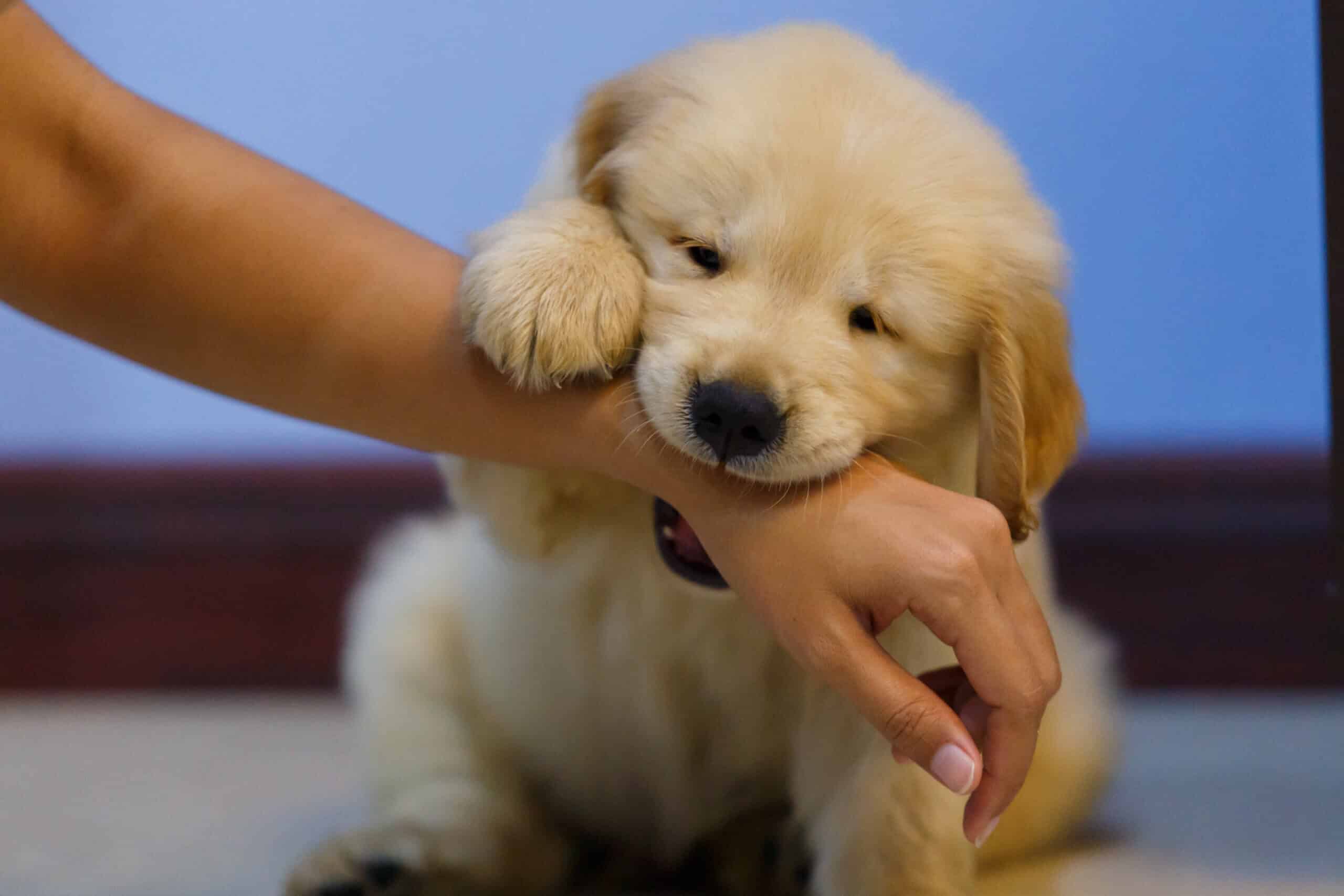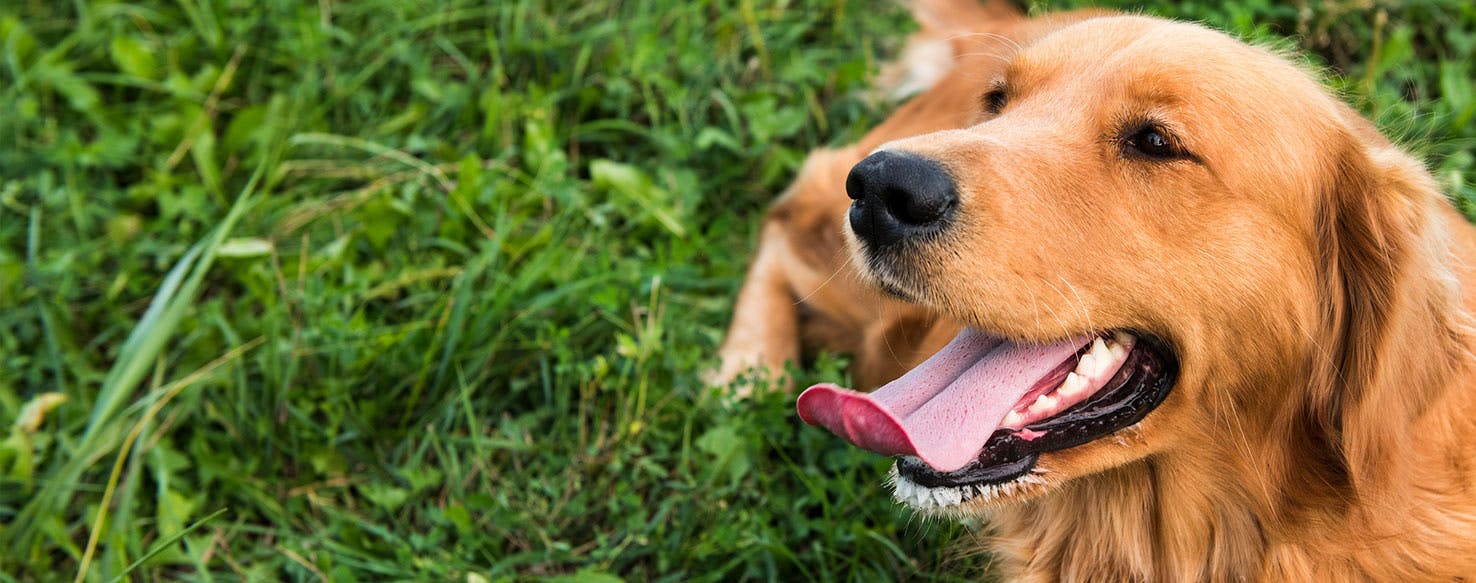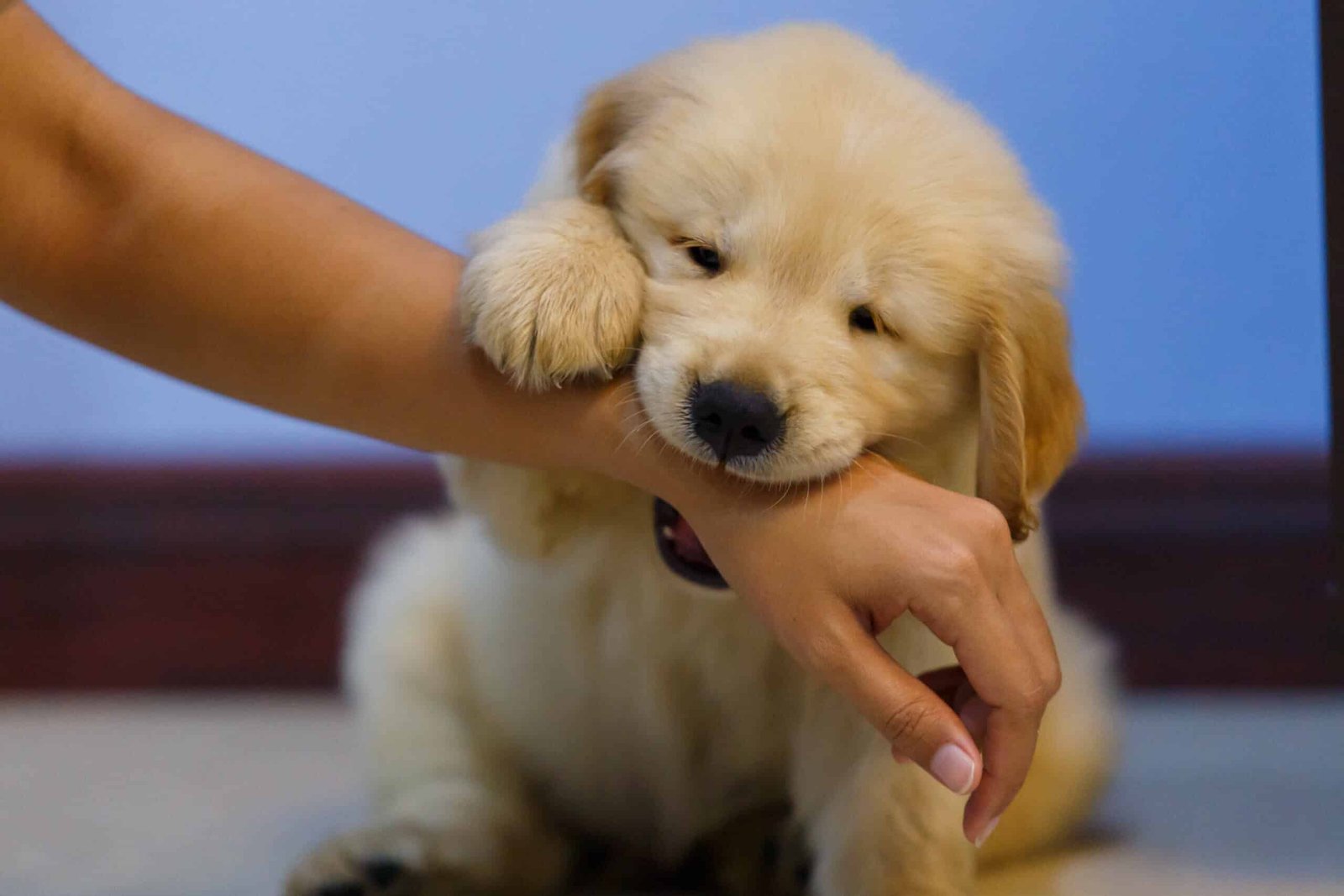Is your curiosity piqued by the question, “Can golden retrievers bite?” Well, let’s delve into this subject to satisfy your inquisitive mind! Golden retrievers are known for their friendly and gentle nature, but like any dog, they have the capability to bite. Don’t worry, though! With proper training, socialization, and responsible ownership, the chances of a golden retriever biting are significantly reduced.
Golden retrievers have a reputation for being loving companions and family pets. They are generally gentle, patient, and playful dogs. However, it’s essential to remember that dogs, including golden retrievers, have natural instincts and behaviors that can occasionally lead to biting incidents.
Training your golden retriever is crucial in ensuring they understand what behavior is acceptable and what is not. Positive reinforcement methods such as rewards and praise can be highly effective in teaching them proper manners. Socializing your dog from an early age is also vital, as it helps them become well-adjusted and comfortable around people and other animals, reducing the likelihood of aggressive behavior.
Remember, responsible dog ownership means understanding that every dog has the potential to bite, regardless of breed. It’s important to supervise interactions between your golden retriever and children, as well as seek professional help if you notice any concerning behaviors. By providing love, care, and guidance, you can help your golden retriever become a well-behaved and happy member of your family.
Golden Retrievers can bite, like any other dog breed. However, they are generally known for their friendly and gentle temperament. It’s important to note that any dog has the potential to bite if they feel threatened or provoked. Training, socialization, and proper handling are essential in preventing aggressive behavior in Golden Retrievers. Always remember to approach dogs with caution, respect their boundaries, and teach children how to interact with them safely.

Can Golden Retrievers Bite? Understanding Their Behavior and Preventing Incidents
Golden Retrievers are known for their friendly and gentle nature, but just like any other dog breed, they have the potential to bite. It’s important for dog owners and the general public to understand the factors that contribute to biting incidents and how to prevent them. In this article, we will delve into the reasons behind Golden Retriever bites, their behavior, and provide tips on how to minimize the risk of biting incidents.
Understanding the Triggers for Golden Retriever Bites
Golden Retrievers are generally considered to be a gentle breed with a low aggression level. However, there are certain triggers that can cause even the most well-behaved Golden Retriever to bite. These triggers include:
- Pain or discomfort: Just like humans, dogs may bite when they are in pain or feeling unwell. It’s important for owners to closely monitor their Golden Retrievers for any signs of discomfort or injury and seek veterinary attention if necessary.
- Protecting their territory: Golden Retrievers are known to be protective of their family and their home. If they feel threatened or sense an intruder, they may resort to biting as a way to defend themselves and their loved ones.
- Fear or anxiety: Dogs may bite when they feel scared, anxious, or cornered. It’s important to provide a safe and comfortable environment for Golden Retrievers and to avoid situations that may trigger fear or anxiety.
While Golden Retrievers are generally good-natured, it’s crucial to remember that they are still animals with instincts. By understanding these triggers, owners can minimize the risk of biting incidents and ensure a safe environment for everyone involved.
Preventing Golden Retriever Bites: Training and Socialization
Preventing Golden Retriever bites starts with proper training and socialization from a young age. Here are some important steps to take:
- Start early: Begin training your Golden Retriever as soon as you bring them home. Basic commands such as “sit,” “stay,” and “leave it” are essential in establishing boundaries and teaching them proper behavior.
- Socialize your dog: Expose your Golden Retriever to different environments, people, and other animals. This helps them become comfortable and confident in various situations, reducing the likelihood of fear-based aggression.
- Provide positive reinforcement: Reward your Golden Retriever with treats, praise, and affection when they exhibit good behavior. This positive reinforcement encourages them to repeat desirable actions and helps build a strong bond between you and your dog.
- Be consistent: Consistency is key when training a Golden Retriever. Use the same commands, hand signals, and rewards to avoid confusing your dog and make the training process more effective.
It’s important to note that while training and socialization significantly reduce the risk of biting incidents, they do not guarantee that a Golden Retriever will never bite. It’s always a good idea to supervise interactions between dogs and children or unfamiliar individuals to prevent any potential conflicts.
Recognizing the Warning Signs and Seeking Professional Help
Even with proper training and socialization, it’s crucial to be aware of the warning signs that may indicate a potential bite. Some common signs of an uncomfortable or agitated Golden Retriever include:
- Growling or snarling
- Stiff body posture
- Showing teeth or snapping
- Backing away or trying to hide
If you notice any of these signs, it’s important to take appropriate action. This may include removing your dog from the triggering situation, seeking professional help from a certified dog behaviorist, or consulting with your veterinarian to rule out any possible underlying medical conditions.
Responsibility as Dog Owners and Educating the Public
As responsible dog owners, it is important to remember that preventing biting incidents goes beyond just training and socializing our own pets. It also involves educating the public about how to interact with dogs safely. Here are a few tips to keep in mind:
- Teach children proper dog etiquette: Educate children about the importance of respecting a dog’s personal space, not approaching unfamiliar dogs without permission, and how to safely interact with dogs.
- Supervise interactions: Always supervise interactions between dogs and young children to prevent any potential accidents. Teach children to never approach a dog while they are eating, sleeping, or caring for puppies.
- Encourage responsible ownership: Encourage other dog owners to prioritize training, socialization, and responsible ownership to minimize incidents of biting. This includes proper leash usage, keeping dogs on a leash in public areas, and cleaning up after their pets.
By working together to promote responsible dog ownership and educating the public, we can create a safer environment for both humans and our beloved Golden Retrievers.
Do Golden Retrievers Bite More Than Other Dog Breeds?
While Golden Retrievers are generally gentle and well-mannered, it is important to understand that any dog, regardless of breed, has the potential to bite. The likelihood of dog bites depends on various factors, including individual temperament, training, socialization, and the specific circumstances surrounding the interaction.
Factors That Influence Dog Bites
The frequency and severity of dog bites can be influenced by several factors:
- Breed tendencies: Certain dog breeds have been historically bred for specific purposes, such as guarding or herding. These breeds may have a higher risk of exhibiting protective or aggressive behavior if not properly trained and socialized.
- Training and socialization: The way a dog is trained and socialized from a young age greatly influences its behavior and propensity to bite. Dogs that have received proper training and socialization are less likely to resort to biting as a form of communication or defense.
- Individual temperament: Just like humans, dogs have individual personalities and temperaments. Some dogs may naturally be more inclined to be fearful or reactive, while others may have a naturally calm and relaxed demeanor. Individual temperament plays a significant role in determining the likelihood of a dog biting.
- Environmental factors: The dog’s living environment, level of physical exercise, exposure to new experiences, and the quality of social interactions all contribute to their behavior. Dogs living in stressful or poorly managed environments may be more prone to biting.
Promoting Responsible Ownership and Preventing Biting Incidents
Regardless of breed, it is every dog owner’s responsibility to promote responsible ownership and prevent biting incidents. Here are some important steps to take:
- Train and socialize your dog: Enroll your dog in obedience classes and socialization programs from a young age. This helps them learn appropriate behavior and become comfortable in various situations.
- Supervise interactions: Always supervise interactions between your dog and unfamiliar individuals or children. If your dog shows signs of discomfort or stress, provide them with a safe space and remove them from the situation.
- Spay or neuter your dog: Spaying or neutering your dog can reduce the likelihood of certain behavioral problems, including aggression.
- Be a responsible advocate: Educate others about responsible dog ownership and the importance of proper training, socialization, and supervision. Encourage dog owners to be proactive in preventing biting incidents.
It is essential to remember that a dog’s behavior is influenced by a combination of genetic factors, training, and environmental influences. By being a responsible owner and promoting safe and appropriate interactions, we can help minimize the risk of biting incidents, regardless of the breed.
Key Takeaways: Can Golden Retrievers Bite?
- Golden Retrievers are generally friendly and gentle dogs.
- Like any dog, a Golden Retriever can bite if they feel threatened or scared.
- Proper training and socialization can reduce the likelihood of a Golden Retriever biting.
- Children should always be supervised around dogs, including Golden Retrievers.
- If a Golden Retriever shows signs of aggression, seek professional help from a dog trainer or behaviorist.
Frequently Asked Questions
Golden retrievers are known for their friendly and gentle nature, but like any dog, they have the potential to bite. Here are some common questions about whether golden retrievers can bite and how to prevent such incidents.
1. Are golden retrievers aggressive dogs?
Golden retrievers are generally not aggressive dogs. They have a friendly and gentle temperament, making them excellent family pets. However, like any breed, individual golden retrievers may display aggressive behavior due to various reasons, such as fear, pain, or insufficient socialization. It is important to remember that aggression is not a breed-specific characteristic, and any dog, including golden retrievers, can become aggressive if not properly trained and socialized.
To prevent aggression in golden retrievers, it is crucial to provide them with proper socialization from a young age. Exposing them to different people, animals, and environments will help them become well-adjusted and less likely to display aggressive behavior. Consistent, positive reinforcement training is also essential to shape their behavior and teach them appropriate ways to interact with humans and other animals.
2. Can golden retrievers bite?
Yes, golden retrievers have the physical capability to bite, just like any dog breed. However, it is essential to understand that biting in dogs is usually a sign of distress, fear, or pain, rather than an inherent aggressive tendency. Golden retrievers are not typically prone to biting, and instances of bites from well-socialized and properly trained golden retrievers are relatively rare.
To minimize the likelihood of a golden retriever biting, it is crucial to provide them with proper training, socialization, and care. Ensuring they receive regular exercise and mental stimulation reduces the possibility of boredom-related biting. Teaching them bite inhibition from a young age and monitoring their behavior closely can also help prevent potential biting incidents.
3. What should I do if a golden retriever bites?
If a golden retriever bites, it is important to take immediate action to ensure the safety of everyone involved. Here are the steps to follow:
– First, separate yourself and others from the dog to prevent further bites or injuries.
– Clean the wound with mild soap and water, applying an antiseptic ointment if available.
– Seek medical attention if the bite is deep, bleeding profusely, or if there are signs of infection.
– Report the incident to the appropriate authorities, such as animal control, if necessary.
– Assess the situation and try to identify any potential triggers or circumstances that led to the biting incident. This can help prevent future occurrences and address any underlying issues.
4. How can I prevent my golden retriever from biting?
Preventing biting incidents in golden retrievers involves proactive steps in their upbringing and training:
– Start socializing your golden retriever from a young age, exposing them to various environments, people, and animals in a positive and controlled manner.
– Provide consistent and positive reinforcement training to teach them appropriate behavior and commands.
– Use gentle and force-free training methods to build trust and discourage any aggressive tendencies.
– Ensure your golden retriever receives regular exercise, mental stimulation, and attention to prevent boredom-related biting.
– Supervise interactions between your golden retriever and children or other pets to prevent any potential conflicts or biting incidents.
5. Are golden retrievers good with children?
Golden retrievers are generally very good with children. They have a patient, gentle, and tolerant nature, making them suitable family pets. However, it is vital to supervise interactions between young children and dogs to prevent any unintentional harm to either party. Teaching children how to approach and interact with dogs responsibly is also essential for maintaining a safe and positive relationship between golden retrievers and children.
Children should be taught to respect a dog’s boundaries, avoid disturbing them during rest or meal times, and refrain from pulling ears or tails. Regularly monitoring interactions and providing proper training and socialization to both the dog and the child can help foster a strong bond and ensure a harmonious relationship between golden retrievers and children.

Do This Every Day To Stop Golden Retriever Puppy Biting
Summary
Golden retrievers are generally friendly dogs, but like any other dog, they can bite if provoked or scared. It’s important to treat dogs with respect and kindness to avoid any potential biting incidents. Children should always be supervised when interacting with dogs and avoid behaviors that could make them feel threatened. If you encounter a biting dog, it’s crucial to stay calm, avoid eye contact, and slowly back away. Remember, prevention is key to keeping everyone safe and maintaining a positive relationship with our furry friends.
In summary, while golden retrievers are known for their gentle nature, it’s essential to understand that all dogs have the potential to bite. By treating dogs with respect, teaching children how to interact safely, and recognizing and respecting their boundaries, we can minimize the chances of any biting incidents. Owning a dog is a wonderful experience, but it’s important to ensure the safety and well-being of both humans and animals in all interactions.
